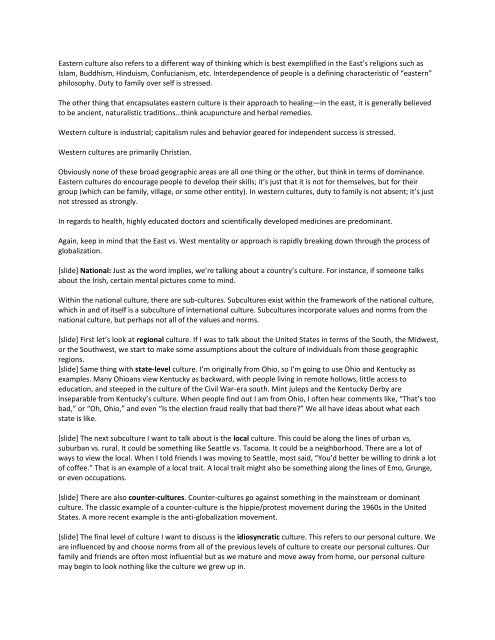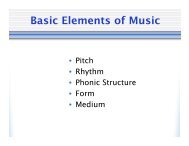Culture We can think about culture a couple of different ways: Big C ...
Culture We can think about culture a couple of different ways: Big C ...
Culture We can think about culture a couple of different ways: Big C ...
Create successful ePaper yourself
Turn your PDF publications into a flip-book with our unique Google optimized e-Paper software.
Eastern <strong>culture</strong> also refers to a <strong>different</strong> way <strong>of</strong> <strong>think</strong>ing which is best exemplified in the East’s religions such as<br />
Islam, Buddhism, Hinduism, Confucianism, etc. Interdependence <strong>of</strong> people is a defining characteristic <strong>of</strong> “eastern”<br />
philosophy. Duty to family over self is stressed.<br />
The other thing that encapsulates eastern <strong>culture</strong> is their approach to healing—in the east, it is generally believed<br />
to be ancient, naturalistic traditions…<strong>think</strong> acupuncture and herbal remedies.<br />
<strong>We</strong>stern <strong>culture</strong> is industrial; capitalism rules and behavior geared for independent success is stressed.<br />
<strong>We</strong>stern <strong>culture</strong>s are primarily Christian.<br />
Obviously none <strong>of</strong> these broad geographic areas are all one thing or the other, but <strong>think</strong> in terms <strong>of</strong> dominance.<br />
Eastern <strong>culture</strong>s do encourage people to develop their skills; it’s just that it is not for themselves, but for their<br />
group (which <strong>can</strong> be family, village, or some other entity). In western <strong>culture</strong>s, duty to family is not absent; it’s just<br />
not stressed as strongly.<br />
In regards to health, highly educated doctors and scientifically developed medicines are predominant.<br />
Again, keep in mind that the East vs. <strong>We</strong>st mentality or approach is rapidly breaking down through the process <strong>of</strong><br />
globalization.<br />
[slide] National: Just as the word implies, we’re talking <strong>about</strong> a country’s <strong>culture</strong>. For instance, if someone talks<br />
<strong>about</strong> the Irish, certain mental pictures come to mind.<br />
Within the national <strong>culture</strong>, there are sub-<strong>culture</strong>s. Sub<strong>culture</strong>s exist within the framework <strong>of</strong> the national <strong>culture</strong>,<br />
which in and <strong>of</strong> itself is a sub<strong>culture</strong> <strong>of</strong> international <strong>culture</strong>. Sub<strong>culture</strong>s incorporate values and norms from the<br />
national <strong>culture</strong>, but perhaps not all <strong>of</strong> the values and norms.<br />
[slide] First let’s look at regional <strong>culture</strong>. If I was to talk <strong>about</strong> the United States in terms <strong>of</strong> the South, the Midwest,<br />
or the Southwest, we start to make some assumptions <strong>about</strong> the <strong>culture</strong> <strong>of</strong> individuals from those geographic<br />
regions.<br />
[slide] Same thing with state-level <strong>culture</strong>. I’m originally from Ohio, so I’m going to use Ohio and Kentucky as<br />
examples. Many Ohioans view Kentucky as backward, with people living in remote hollows, little access to<br />
education, and steeped in the <strong>culture</strong> <strong>of</strong> the Civil War-era south. Mint juleps and the Kentucky Derby are<br />
inseparable from Kentucky’s <strong>culture</strong>. When people find out I am from Ohio, I <strong>of</strong>ten hear comments like, “That’s too<br />
bad,” or “Oh, Ohio,” and even “Is the election fraud really that bad there” <strong>We</strong> all have ideas <strong>about</strong> what each<br />
state is like.<br />
[slide] The next sub<strong>culture</strong> I want to talk <strong>about</strong> is the local <strong>culture</strong>. This could be along the lines <strong>of</strong> urban vs,<br />
suburban vs. rural. It could be something like Seattle vs. Tacoma. It could be a neighborhood. There are a lot <strong>of</strong><br />
<strong>ways</strong> to view the local. When I told friends I was moving to Seattle, most said, “You’d better be willing to drink a lot<br />
<strong>of</strong> c<strong>of</strong>fee.” That is an example <strong>of</strong> a local trait. A local trait might also be something along the lines <strong>of</strong> Emo, Grunge,<br />
or even occupations.<br />
[slide] There are also counter-<strong>culture</strong>s. Counter-<strong>culture</strong>s go against something in the mainstream or dominant<br />
<strong>culture</strong>. The classic example <strong>of</strong> a counter-<strong>culture</strong> is the hippie/protest movement during the 1960s in the United<br />
States. A more recent example is the anti-globalization movement.<br />
[slide] The final level <strong>of</strong> <strong>culture</strong> I want to discuss is the idiosyncratic <strong>culture</strong>. This refers to our personal <strong>culture</strong>. <strong>We</strong><br />
are influenced by and choose norms from all <strong>of</strong> the previous levels <strong>of</strong> <strong>culture</strong> to create our personal <strong>culture</strong>s. Our<br />
family and friends are <strong>of</strong>ten most influential but as we mature and move away from home, our personal <strong>culture</strong><br />
may begin to look nothing like the <strong>culture</strong> we grew up in.











